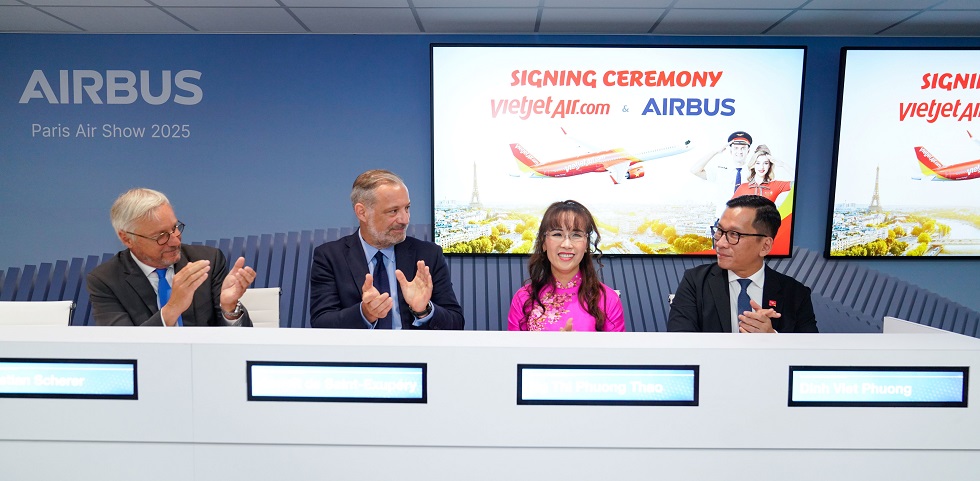Vietjet and aircraft manufacturer Airbus today announced a major new order for 100 A321neo aircraft, with the potential to add another 50 in the future. The event took place at the 2025 Lé Bourget Paris Airshow, underscoring the growing economic cooperation between Vietnam, France, and Europe. The landmark agreement also represents a significant step in Vietjet’s growth strategy as a multi-national aviation group.
The latest order follows Vietjet’s commitment for 20 additional A330neo aircraft last month, bringing the airline’s total widebody aircraft on order to 40. These new aircraft will enable the airline to boost capacity on key routes across the Asia-Pacific region, as well as to introduce future long haul services to Europe.
Vietjet Chairwoman Nguyen Thi Phuong Thao said: “I have a vision and the determination to make Vietnam a regional aviation hub for passenger transportation, technical services, logistics, training, research, global supply chains, and aviation infrastructure. We will continue to develop a robust and modern fleet to support that goal. Today’s agreement with Airbus is more than a commercial contract—it is a significant milestone that marks the beginning of Vietjet’s new journey: a journey of global expansion, new growth drivers, enhanced connectivity, and the development of a sustainable aviation ecosystem powered by ambition and transformation.”
Benoît de Saint-Exupéry, Airbus EVP Sales of the Commercial Aircraft business, said: “Our latest agreement comes just weeks after the airline placed an additional order for A330neo widebody aircraft. Together the A321neo and A330neo will be perfect partners for Vietjet to continue to spread its wings, efficiently matching capacity more closely to demand across its network. The airline will also benefit from the high levels of technical commonality that are unique to latest generation Airbus aircraft.”

The A321neo is the largest member of Airbus’ best-selling A320neo Family, offering unparalleled range and performance. By incorporating new generation engines and Sharklets, the A321neo brings a 50% noise reduction and more than 20% fuel savings and CO₂ reduction compared to previous generation single-aisle aircraft, while maximising passenger comfort in the widest single-aisle cabin in the sky.
As with all in-production aircraft, the A321neo is able to operate with up to 50% Sustainable Aviation Fuel (SAF), with a target to increase to up to 100% SAF capability by 2030.
According to Vietjet’s 2024 ESG Sustainability Report, the airline ranks among the world’s lowest in CO₂ emissions per passenger.
Vietjet currently operates a fleet of over 120 new-generation, fuel-efficient aircraft and has placed orders for more than 400 aircraft. As its passenger volumes continue to grow, the airline is actively expanding its global flight network while advancing fleet modernisation through the strategic partnership with Airbus.









